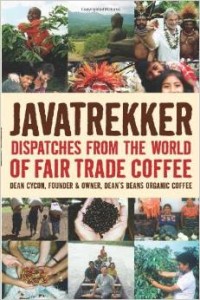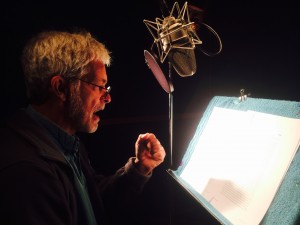
 ~October, 2014~
~October, 2014~
This is an audiobook in that gives you a rare look inside your morning brew and the world of Fair-Trade Coffee, written and narrated by the man who led the charge. Dean Cycon, of Dean’s Beans Organic Coffee .
Here’s a review of JAVATREKKER from Andrea Cumbo writing for www.environmentalblog.org;
“Six shelves of coffee, at least ten feet long. French Roast, Sumatran, Decaf, Whole Bean, canisters, bags … so much choice for a little hot liquid in the morning. And yet, that choice could help change the lives of coffee farmers around the world. This is what I have come to understand from reading Javatrekker:Dispatches from the World of Fair Trade Coffee by Dean Cycon of Dean’s Beans. For me, now, the only choice will be one that says “fair trade” on the bag or canister. No other choice would be a right one.
Cycon’s book chronicles his travels around the world as he meets with coffee growers and processers, trying to help them establish or improve their fair systems for selling their coffee. He visits the Oromo in Ethiopia, the Ashaninkas in Peru, the Asaro Mudmen in Papua New Guinea, and other indigineous groups, combining a belief in the power of fair trade cooperatives to improve the lives of these people with a deep knowledge and respect for the people and their cultures. His trips are not evangelical; he’s not out to save the world by making it like his. He’s traveling to help people help themselves, living up to the old “teach a man to fish” adage.
The writing here is personal; Cycon tells us not only of the coffee, but of the rigorous treks to reach the coffee. Not just of the trees or the beans, but of the cultural customs that dominate each village he visits. Not just of the money, but of the flesh and life that has been given for what is sometimes simply a few cents a day. This book is a not a chronicle in the life of a coffee bean; it is the epic struggle of people to be treated justly and honestly for their hard work. Cycon’s words are words of a witness, a clumsy, occasionally inappropriate (as when he snaps a picture of a group of Arhuaco farmers, much to their chagrin), but always caring witness who has taken the time to know these people, to see them, to share their stories with us.
This book would be simply another dry collection of tales from an activist who doesn’t understand the complexities of culture and who doesn’t see beyond his own goals, but it isn’t that. Cycon notes, often, that what he thought would be so simple, is simply not. From the realization that the Kenyan government has corrupted even the fair trade system, to the knowledge that the self-educated Mamos of Colombia may know more about saving the earth from humans than he (or I, for that matter) will ever know, Cycon grants that his wisdom is not unlimited, his guidance not perfect. As he says, “Our understanding of justice, in trade and society in general, cannot be confined to a formula. Fair trade, or any movement that is intended to improve the quality of life for people, is more accurately seen as a process. The more we work with the peoples in this book and beyond, the deeper we plunge into the dynamics of their societies, their ecologies, and their economies. Each layer reveals a more profound set of relationships that we must consider as we evolve toward more human and just relationships. Being open to the experiences of each culture not only makes us more aware but also makes our lives richer.” This book records a man’s journey into learning, one he undertakes because it is the right – but not always easy – thing to do.
The next time I return to those shelves of coffee I will remember Dean Cycon and the people he has introduced me to through his words. Now, I will only buy fair trade coffee, trusting that while it is the more expensive and therefore harder thing, it is the right thing to do.”

